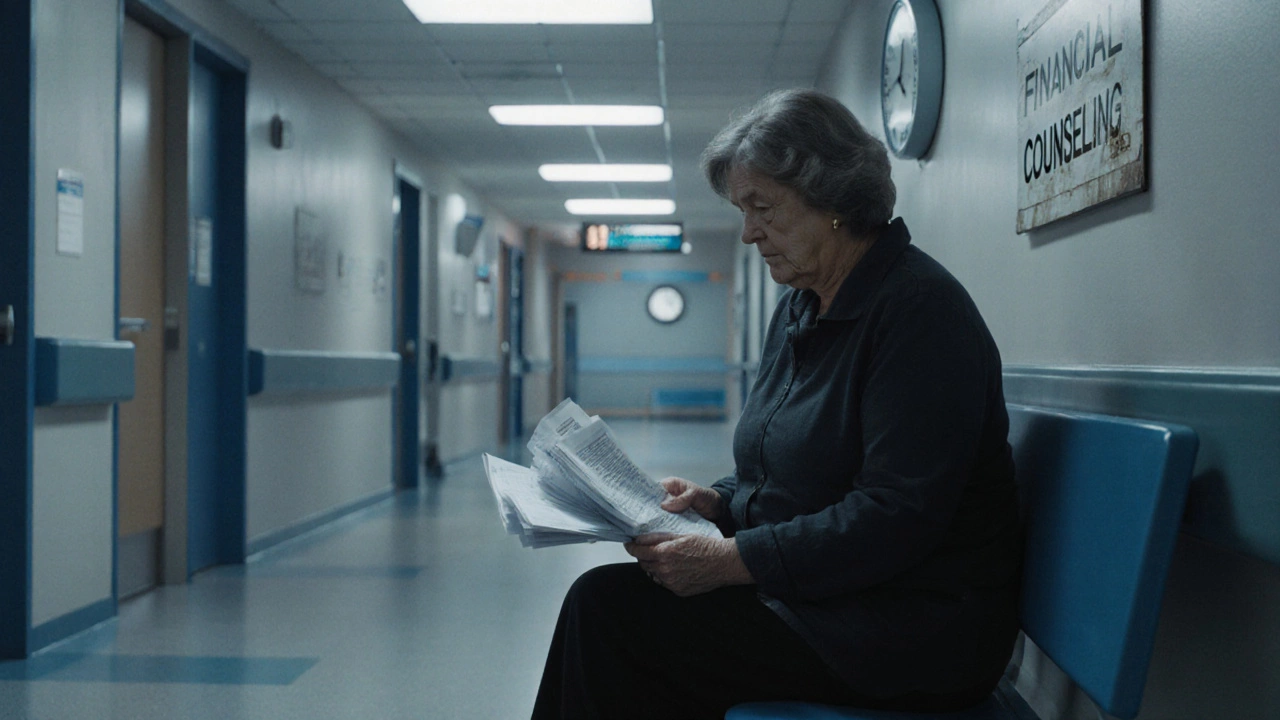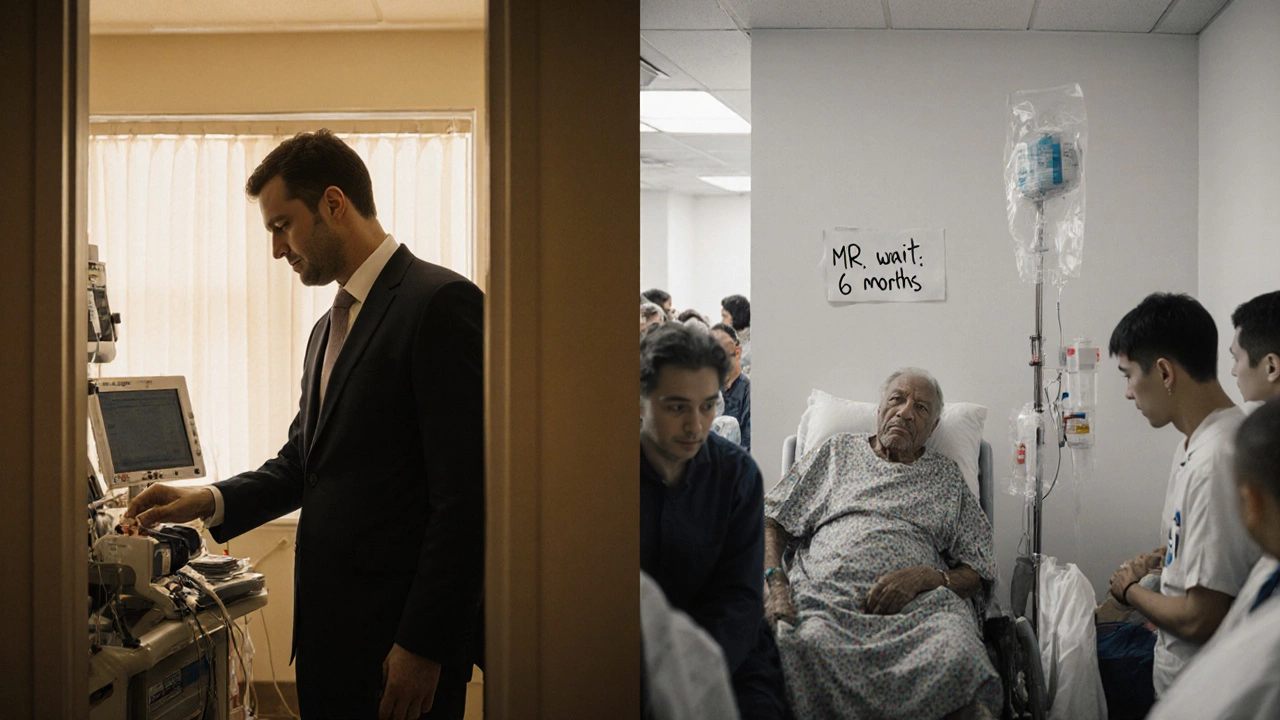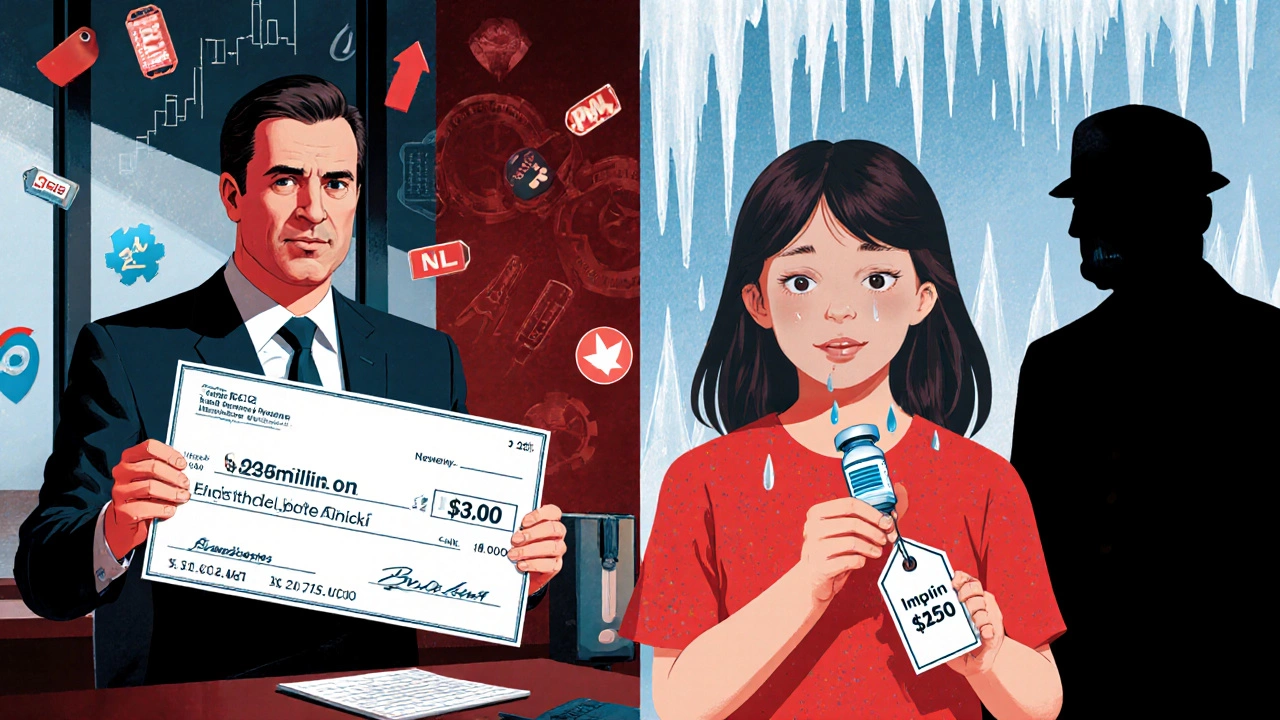 Nov, 23 2025
Nov, 23 2025
Healthcare Cost Comparison Calculator
Compare what you'd pay out-of-pocket for common medical scenarios in privatized versus public healthcare systems. Based on real data from the article.
Medical Scenario
Cost Comparison Results
Select a medical scenario to see costs comparison
When people say privatized healthcare is bad, they’re usually reacting to stories: a family skipping insulin because it costs $500 a month, a parent watching their child wait six months for an MRI, or a retiree choosing between groceries and their blood pressure pills. These aren’t hypotheticals. They’re real, daily choices in countries where healthcare is treated like a product-not a right.
What privatized healthcare actually means
Privatized healthcare doesn’t just mean private hospitals. It means the entire system runs on profit. Insurance companies decide what’s covered. Hospitals set prices based on what the market will bear. Doctors get paid per procedure, not per outcome. The goal isn’t health-it’s revenue.
In the U.S., a single hospital stay for pneumonia can cost $15,000. In Canada, it’s $1,200-and that’s covered by taxes. In New Zealand, it’s free at the point of care. The difference isn’t about how good the doctors are. It’s about who’s paying.
Privatization shifts risk from the system to the individual. If you’re healthy and wealthy, you might not notice. But if you’re working two jobs, have a chronic condition, or live paycheck to paycheck, the system is designed to fail you.
It’s not about quality-it’s about access
People often claim private healthcare is better because you get faster service. That’s true-if you can afford it. In the U.S., someone with good insurance might see a specialist in three days. Someone without insurance? They’ll wait until they’re in the ER, often with a ruptured appendix or a stroke.
Studies from the Commonwealth Fund show that countries with universal systems have lower death rates from treatable conditions. The U.S., despite spending nearly twice as much per person on healthcare as other wealthy nations, ranks last in access, efficiency, and equity among 11 high-income countries.
Privatization doesn’t make care better. It makes care selective.
The hidden costs no one talks about
When you hear ‘private healthcare is more efficient,’ think again. Administrative costs in the U.S. healthcare system make up 25% of total spending. In Canada, it’s 17%. In the U.K., it’s 12%. Why? Because private insurers need billing departments, marketing teams, and profit margins.
Every time you pay a co-pay, get a surprise bill, or fight with an insurer over ‘out-of-network’ charges, you’re paying for that overhead. That’s money that could’ve gone to actual care.
And then there’s the psychological toll. A 2023 study in JAMA found that people in privatized systems report higher levels of stress about medical bills than those in public systems-even when their income was the same. Fear of debt becomes a chronic condition.
What happens when you can’t pay?
In the U.S., medical debt is the leading cause of bankruptcy. Over 500,000 families file for bankruptcy each year because of healthcare bills. That’s not a statistic-it’s a mother selling her car to pay for her son’s chemotherapy. It’s a veteran skipping dialysis because the bill came to $18,000.
Privatized systems don’t just leave people behind-they actively push them into crisis. Emergency rooms become the safety net, but they’re the most expensive place to get care. By the time someone gets there, their condition is worse, the treatment is costlier, and the damage is often irreversible.
There’s no moral justification for a system where your life depends on your bank account.

Does privatization improve innovation?
Proponents argue that private systems drive innovation. But most breakthroughs in medicine-antibiotics, vaccines, MRI machines, insulin production-came from public research. The National Institutes of Health in the U.S. funded the research behind 75% of the top 10 drugs in the last decade.
Private companies then buy the patents, jack up the prices, and call it innovation. Take insulin: developed with public funding in the 1920s. Today, a vial costs over $250 in the U.S., even though it costs less than $10 to produce. That’s not innovation. That’s exploitation.
Privatization doesn’t create innovation. It monetizes it.
What about choice?
‘You have more choice in private healthcare,’ they say. But choice means nothing if you can’t afford the options. Would you call it choice if you could pick between a $500 pill and a $1,000 pill-but you only have $300?
In a public system, you don’t get to pick your surgeon based on their Instagram followers. You get the best available care based on need. That’s not a limitation-it’s fairness.
And here’s the truth: most people in private systems don’t actually feel empowered. They feel trapped. Trapped by premiums, trapped by deductibles, trapped by the fear of what happens if they get sick.
Real-world examples: New Zealand vs the U.S.
In New Zealand, if you break your leg, you go to the hospital. You get an X-ray, a cast, pain relief, and follow-up care-all free. You don’t get a bill. You don’t get a call from a collections agency. You heal.
In the U.S., the same broken leg could cost $12,000 to $30,000. If you’re uninsured? You’ll be offered a payment plan at 20% interest. If you miss a payment? Your credit gets crushed. If you can’t pay? The hospital may send your case to a debt collector-or even sue you.
One system prioritizes healing. The other prioritizes billing.

Who benefits from privatized healthcare?
Not patients. Not doctors. Not nurses.
The winners are shareholders. Executives. Insurance CEOs. Pharmaceutical lobbyists. In 2023, the CEO of UnitedHealth Group made $225 million. The average nurse in the U.S. made $80,000. That’s not a gap. That’s a system rigged for profit.
When healthcare becomes a business, the people who need care most become the least valuable customers.
Is there a middle ground?
Some argue for a hybrid system-public for emergencies, private for extras. But that’s not how healthcare works. A person with diabetes needs insulin, regular check-ups, eye exams, and foot care. They can’t pick and choose what’s ‘essential.’
Split systems create two-tier care. The rich get full service. The rest get scraps. And the gaps? They kill.
There’s no ethical compromise when human lives are on the line.
What does ‘bad’ really mean?
Calling privatized healthcare ‘bad’ isn’t an opinion. It’s a conclusion based on outcomes:
- Higher death rates from treatable conditions
- More bankruptcies from medical bills
- Lower life expectancy
- Higher administrative waste
- Worse mental health due to financial stress
It’s not about ideology. It’s about data. And the data doesn’t lie.
Privatized healthcare isn’t broken. It’s working exactly as designed-to make money, not to save lives.
Is private healthcare more efficient than public healthcare?
No. Private healthcare is less efficient. Administrative costs in private systems are 2-3 times higher than in public systems. In the U.S., over 25% of healthcare spending goes to billing, insurance claims, and profit margins. In Canada or the U.K., that number is under 15%. The money saved in public systems goes directly to patient care, not corporate overhead.
Do people in private systems get better care?
Only if they can afford it. People with good insurance may get faster appointments, but they’re not getting better outcomes. Studies show no significant difference in survival rates for cancer, heart disease, or stroke between the U.S. and countries with universal care-once you account for income and access. The real difference is who gets care at all.
Can private healthcare ever be fair?
Not as it’s currently structured. Profit-driven systems require people to pay for care, which means those with less money get less care. Fairness in healthcare means equal access based on need, not income. That’s impossible under a model where every service has a price tag. Some argue for regulated private systems, but history shows that regulation is always weakened by lobbying-leading to higher costs and lower coverage over time.
Why do some doctors support privatized healthcare?
Some doctors benefit financially-especially specialists who perform high-revenue procedures. Others support it because they believe competition improves quality. But most frontline doctors, especially in primary care, are frustrated by the bureaucracy, the insurance paperwork, and the pressure to see more patients to make ends meet. The system rewards volume over care, and many doctors are leaving the profession because of it.
What happens to emergency care in privatized systems?
Emergency rooms are required by law to treat anyone who walks in-no matter their ability to pay. But that doesn’t mean they’re free. After treatment, you’ll get a bill. If you can’t pay, it goes to collections. In some states, hospitals have sued patients for unpaid ER bills. Emergency care becomes a trap: you survive the crisis, then face financial ruin.
Is privatized healthcare the reason for long wait times in public systems?
No. Long wait times in public systems are caused by underfunding, not by people choosing private care. When governments cut budgets for hospitals, staff, and equipment, wait times rise. In countries with strong public systems like Germany or Sweden, wait times are shorter than in the U.S. because they invest in capacity-not profit. Privatization doesn’t fix wait times; it makes them worse for those who can’t pay.
